UNITARIAN
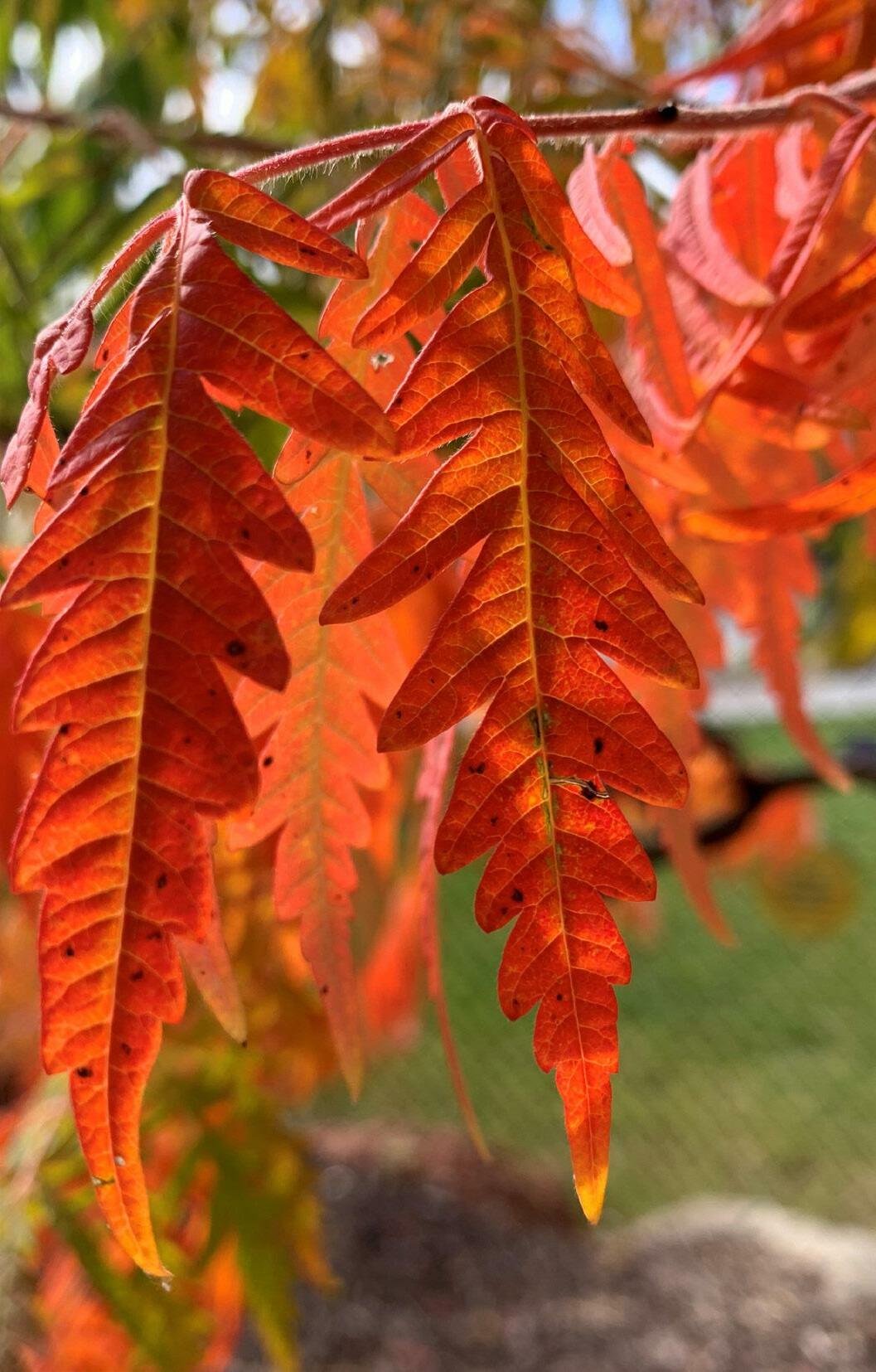


The Beautiful Changes 3
From the Editor 4
From the Ministers 5
From the Board 6-7
Spotlight On: Coming of Age 8-9
Great Hungarian Bake Off 10-11
Autumnfest Cabaret 12
Community Info 13
A Month of Services 14-15
Contact Us 16
One wading a Fall meadow finds on all sides
The Queen Anne’s Lace lying like lilies
On water; it glides So from the walker, it turns Dry grass to a lake, as the slightest shade of you Valleys my mind in fabulous blue Lucernes.
The beautiful changes as a forest is changed

By a chameleon’s tuning his skin to it;
As a mantis, arranged On a green leaf, grows Into it, making the leaf leafier, and proves Any greenness is deeper than anyone knows.
Your hands hold roses always in a way that says They are not only yours; the beautiful changes In such kind ways, Wishing ever to sunder Things and things’ selves for a second finding, to lose For a moment all that it touches back to wonder.
Richard Wilbur, 1947
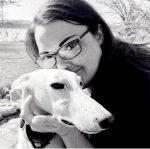
of years ago, I went through a series of big upheavals in quick succession, so that within a span of about six months, nearly every major element in my life changed. Marriage? Ended. Job? Position eliminated. House? Our landlords sold it from under us, and the new owners bulldozed it. So much change that quickly was disorienting. Sometimes it felt like I was living on a different timeline than all of my friends were—as if I had lived through six years in what everyone else experienced as six months. One day I was married, working a stagnant but stable job, tending to the garden in our quirky rental house; the next I was separated, unemployed, driving past a hole in the ground where my house used to be.
During this period of my life, people liked to tell me stories about butterflies, one of our culture’s favorite metaphors for change. “Don’t worry,” they’d say, “you’re going to come out of this stronger and more beautiful. Like a butterfly.” After the tenth person told me that I was going to become a butterfly, I started wondering about caterpillars and butterflies, and exactly how one turns into the other. I suppose I had always as sumed it was something along the lines of tad poles turning into frogs—the legs appear, the tail disappears, and voila—but caterpillars and but terflies seemed to have really different bodies. How, exactly, would that transformation work?
The answer, as it turns out, is much grosser than I expected. After a caterpillar encloses herself in a chrysalis, she essentially digests her entire body and turns into a soup, where all the cells of her former self rearrange themselves and grow an entirely new body. Somehow, none of the cute books about caterpillars and butterflies I read in childhood mentioned that part.
The more I learned about it, though, the more I realized that this was actually the missing piece of the metaphor for me. Because when people told me that after all this upheaval I would turn into a butterfly, I always sensed a hint of impatience in them, as if they wanted me to hurry up and sprout some wings already. I was impatient, too. I would have loved to fast forward through the depressing stuff and transform all my unhap piness into something beautiful, but the annoying thing about this kind of change is that it takes time, often much more than you want it to. I wasn’t ready for wings yet; I was still in the soup.
During a caterpillar’s soup phase [not the scientific term], she is incredibly fragile. If some thing happens to her protective chrysalis—if it’s pierced or punctured at all—she will just ooze out, losing all the possibilities of her future self. It occurred to me that I might be just as fragile. I decided to give myself the only gift I could, the same one the caterpillar gives herself: time. I told myself that I could spend as much time as I needed to in my own soup phase, and I did my very best to trust that with enough time, my cells would rearrange themselves into someone new. And eventually—eventually—they did.
Change is hard, and messy, and it almost always takes much longer than we think it should. We like quick solutions and sped-up makeover mon tages, but real transformation rarely happens overnight. If you find yourself in your own period of upheaval, remember that the caterpillar builds her chrysalis for a reason. Maybe you need to give yourself the space and time to dissolve en tirely. Before you grow your next pair of wings, you might have to spend some time in the soup.
There is a Jewish story—I've found it retold many different ways in many difference places, but my telling of it here owes the most to a version by author Rabbi Edward Feinstein. Once, a Rabbi put the question to his students: how can one know for certain that the night has ended and the day has begun? This was a question with serious implications—in Jewish practice, there are certain prayers to be said during the nighttime, and others that are obligatory in the morning. Knowing when the window for one has closed and the opportunity for the next has begin is no small matter.
The first student to answer said, "I know that the night has ended when I can look out my door and distinguish where my field ends and my neigh bor's field begins." But the Rabbi shook his head at this.
The next student suggested, "I know that the day has begun when I can stand in the road, spin around, and know immediately whether the house I'm facing is mine or my neighbor's." But the Rabbi frowned at this reply as well.
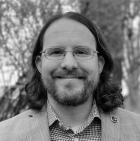
The third student offered, "I know that night has become day when I can stand at the edge of the yard and tell one animal from another with cer tainty—a cow from a horse, a goat from a lamb." At this answer, the Rabbi began to cry.
"No, no. You only divide! You separate your field from another's, your house from another's, one animal from another! Is this all that I have taught you: division? The drawing of lines between this and that, yours and mine? Is this all you believe the Holy One has given you your senses for? So that you might cut apart the world more clean ly?"
As the Rabbi lamented on so, the most shy and humble of his students spoke thus: "When I can look upon the face of a person beside me, and see that the person is my sister, my brother, my friend—then, and only then, do I know that the night has given way to day." And at this, the Rab bi nodded, and smiled.
Our spiritual theme for this month is change, which comes in many sizes and forms; sometimes daily, sometimes once in a lifetime; sometimes gradually, sometimes all at once. But as impor tant as the project of creating change—or simply navigating it—is, it matters just as much how we perceive it. How we know when the change has taken place dictates the meaning we ascribe to it.
As part of our work as your Co-Senior Ministers, Rev. Kelly Crocker and I each have areas where we take the lead, others where we act in support, and still others where we mainly act together. (If you're curious to see some of these specifics, you can find more information on the FUS website at https://fusmadison.org/welcome/our-minis ters/.) We each have our tastes and preferences, and there's a lot to do. But in deciding how to share that work (and re-deciding in the future; these roles are not etched in stone), we view this not as a process of division, but of recognition— the basis for collaboration rather than an assign ment of respective spheres. We hope that you will view it that way, too.
At the end of September, the FUS Board of Trustees participated in a retreat with the Rev. David Pyle, our Regional Lead and Congregational Life Consultant with the MidAmerica Region of the Unitarian Universalist Association. Part of this retreat was focused on our roles as board members and how we can be a more effective board. Especially in a large congregation like FUS, it is critically important that we have clarity on the roles we all play. Our ministers will be sharing about the areas of responsibility between them as CoSenior Ministers, and we wanted to share our learnings about board responsibilities as well.
What kind of world does the congregation seek to build, and what parts of that world is the con gregation ready, committed, and resourced to work on creating right now? These are the ques tions Mission and Vision Discernment strive to answer, by having deep conversations with each other and with the congregation. As we embark on discerning a new mission and vision with the help of our wonderful task force, there will be many opportunities to share your own thoughts.
Ensuring that the assets, resources, and strengths of the congregation are being used for the ful fillment of the congregation’s mission and vision in the world is a critical role of the Board. We learned to think about this responsibility in a more expansive way. While ensuring that money is spent in the right places is a part of this task, we must also ensure that other resources are used to fulfill our mission and vision. Some of those resources include the use of our facil

ities, staff time and energy, time and energy of volunteers and lay leaders—even our reputation in the community can be an asset when used in the right way.
Good policy requires us to be rooted in our mis sion and vision and then answers the question: what is required of us as a congregation when challenges and opportunities arise? Policy should capture learnings in such a way that makes them available and accessible to future leaders. Con gregations are communities of people in cove nanted relationships, not communities of laws. When policy is not being followed, it is covenan tal conversation which determines how to bring people back into relationship, not punitive ac tion.
In order for a board to see what institutional wis dom might need to become policy, or to know if the resources of the congregation are being used in the right way, it must have a practice of looking deeply at the whole organization. The Board must assess the congregations’s health to discern where we are and where we might go. Boards with a healthy practice of congregational assesssment might look beyond their own congregation to see what is happening in other de nominations in our area, or in other UU congre gations near and far.
The Board of Trustees needs to be continuously charting a course for the congregation’s future. A strategic plan should be rooted in a deep under standing of both the (con’t on page 7)
(con’t from page 6) mission/vison and the sustain able resources and assets of the congregation. A strategic plan should also include an under standing of where we have been, where we are now, and the possibilities of where we could go in the future.
Staying connected to the congregation and other stakeholders of FUS requires intentional ef fort. Our relational covenant is meant to help all members of our congregation stay in right relationship with each other, and its concepts are especially important for the board. In addition to maintaining personal relationships with con gregants, the Board must maintain relationships to other elements of FUS, like each of the committees, our ministers, and staff. Key relation ships in the local community and the broader UU community are also important.
We too often think of what is possible through the lens of what we already know. Transforma tion calls the Board to lead toward a new para digm, not to accept that the way the congrega tion has always been is the way the congregation will always be.
Like all of American society, UU congregations have been built within the structures of white supremacy. Transformation is learning about those structures and patterns, seeing them with in our congregation, and finding ways to trans form those patterns into something else—even when that something else may not yet be clear. Transformation is learning about the ways that
power is expressed in the congregation, how it is shared (equally or unequally), and strategizing ways to transform the nature of power in the congregation.
Transformation is also about examining where the congregation is not in tune with the values of Unitarian Universalism, and it seeks to transform the congregation to be closer to those values. All of the previously mentioned practices help to build a congregational governing board that has the credibility, the vision, and the purpose of leading transformation in the congregation.
The Board came away from the retreat with many new ideas for improving our own practic es, and we were energized by our time discussing how we may best serve FUS. If these sev en practices excite you too, you may consider applying to become a board member when the opportunity opens again this spring. As always, the Board would love to hear your feedback, and you can share it with us by emailing me at fus pres@gmail.com.
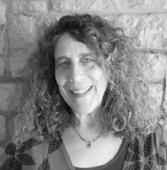
ith this month’s newsletter, the Children’s Religious Exploration (CRE) Ministry Team will once again offer a “Spotlight On...” piece. We’ll take a closer look at each of the curricula that we offer this year so that our wider congregation can see the great work that our children, youth, and teachers are up to. Let’s start at the end of the journey!
Coming of Age (COA) is the last class offered in our CRE program, the culminating class and our rite of passage into adolescence. It is offered to our 9th graders. The curriculum is rich in substance, as facilitators partner with youth in deepening their understanding of themselves, their religious and spiritual beliefs, and the complex world of which they are a part. COA facilitator Bryan Rainey shares, “When a ninth grader looks at the flawed world they’re inheriting, I get why it might be compelling to conclude that nothing really matters. My favorite part of Coming of Age is watching them reject that worldview. It’s a time to step back, reflect on what they care about, and start building their lives around what’s important to them.”
Throughout history and all over the world, peo ple have recognized the transition out of child hood as a profound time of change. We refer to COA as a transition into adolescence rather than adulthood because while the media expos es youth to many of the adult issues of our day, youth are also able to take on adult responsibil ities at a much slower pace than, say, youth in indigenous cultures. In current times and in our culture, ritualized experiences have largely fallen by the wayside. Coming of Age strives to create a ritualized rite of passage for our youth. As COA facilitator Becky Burns observes, there is little space in teens’ life for such substance. “The teen
years are a tumultuous time of life. The COA curric ulum provides a calm in the storm; a place to figure out who you are going to be as you proceed through high school. It is one of the only places in their lives where they can quiet the cyclone of peer pressure, social media, technology, etc., and focus on explor ing their authentic self.”
During the year, there is much exploration of how their lives led them to where they are today. They are challenged to think intentionally about what they want to bring forward into this next phase of their lives, and what it might be time to let go of. They explore their beliefs about God, death, why bad things happen, and different perspectives on theism. They deepen their understanding of Unitarian Universalism by looking at what it means to truly live our principles and by writing an “elevator speech”--a brief and concise description of UUism that can be shared with someone while going seven floors up on an el evator. There is a lot of inward searching to bal ance the outward examination of others’ ideas and perceptions. Each week they hear a “This I Believe” statement (www.thisibelieve.org) that explores how life experiences shape our beliefs. At the end of the year, our COA youth put on their own worship service where they deliver their “This I Believe” statement to you all, our congregants. Former COA participant Phoebe Yancey describes her experince: “Coming of Age meant that I had to really think what I really, tru ly, believe and it didn’t have to be to a higher be ing. ...At the end of Coming of Age, I realized that I had gotten stronger and wiser with every lesson and every day.... [It] made me reflect about myself and the person I want to be now and in the future.”
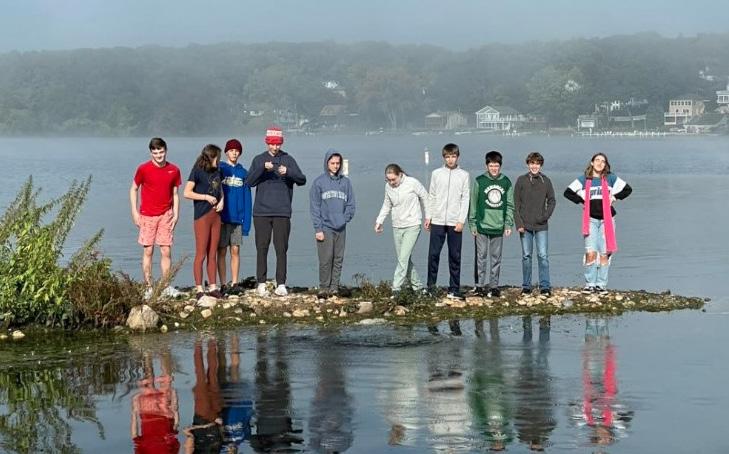
(con’t from page 8) The class, however, is not all seriousness! There is plenty of time for fun and deepening social relationships. Mirabel Roffers is a current participant who describes her expe rience in Coming of Age so far. “I’m currently in Coming of Age, so I can’t speak on the full curricu lum, but what I’ve noticed so far is that through the retreat and our classes, I’ve bonded a lot with fellow classmates, and made thoughtful and deep friend ships with a lot of people with whom I haven’t really interacted before. The lessons are complex and interesting, and very engaging. I’m really enjoying the class so far!”
Like so many teachers, our COA facilitators don’t always see the ripening of the COA experience. “I feel like we are planting seeds that may bloom at a later time. (Of course, many will be eaten by squirrels!) I hope that we help the teens construct a framework that they can use to build their lives.” We hope so too! We also hope that our pro gram’s committment to our youth’s healthy de velopment of self and spirit communicate to them that the FUS community is here to support them on their journeys, now and in the future.
Coming of Age youth at their fall retreat in Delavan, WIKöszönöm szépen! A very big thank you to everyone who participated in and attended our first Great Hungarian Bake Off. We had 11 Bake Off Contestants and each one presented a beautiful and delicious bake. Congratulations to Anne Gillespie, our Bake Off Winner! Anne’s Hungarian Raspberry Cream Roulade was most definitely a Showstopper dessert! The gorgeous day involved delicious food, amazing bakes, and fantastic company. This fundraiser was in support of our Partner Church in Nagyajta. We hope this was the first of many Bake Off competitions here at FUS! For more information about Partner Church, please see www.fusmadison.org/partner-church. Many thanks to our volunteers – Marjie Marion, Deb Lawrence, Mary Savage, Liz Hachten, and Ethel Biro. We hope to see you all at next year’s Bake Off!


Ourin-person autumn themed Cabaret, Saturday, November 12, is just around the corner! This will be a day of joyful activities for the entire family. I have found that planning events with families at the center opens a whole new realm of opportunities. Once again, member and staff engagement is the quiet theme for this year's gathering. Our event hopes to offer something for everyone, believing that when we come together as an extended community, fellowship happens.
As with any event leaning on Mother Nature's goodwill for pleasant fall weather, we are planning a full range of inside and outside activites for the whole family. The Landmark Campus is home to all auction and raffle-related features: tables of silent auction favorites and raffle baskets will be in the Auditorium and spill into the Loggia. You don't want to miss our LIVE auction with MC Steve Goldberg! The Gaebler Livingroom will be bustling with tables of craft making (including creations for your Thanksgiving table), warmed by a fire in the hearth, and humming with voices of all ages. You can make your way to the Atrium Campus to decorate the Commons with the warm colors of the season. We'll celebrate the joy of being together with music and laughter, new and familiar faces, and friends of all ages. Outside the Landmark Hearthroom doors, our fire pits will be blazing! Enjoy our FLW-approved heaters, tables in the shelter tent where you can enjoy hot cocoa and hot cider and make s'mores to warm you from the inside. We'll have food carts in the parking lot until 3 pm--more detail on our food options will be coming soon. And excitingly, a first at Cabaret: animal guests from Haven's Petting Farm, including horse and pony rides. Other activities will include a hike in our prairie, filling bird feeders, or perhaps making fairy houses.
 Cheryll Mellenthin, Project Coordinator
Cheryll Mellenthin, Project Coordinator
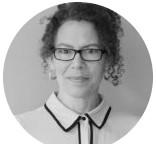
This event also expands to support our Madisonarea community. We'll be collecting your nonperishable food and personal care items for The River Food Pantry, which supports over 1,000 households in Dane County. Learn more about their current needs at their website, www.riverfoodpantry.org. The barrels for your donations will remain at FUS entrances through the following week.
Autumnfest Cabaret is the collaborative effort of staff and members to gather us together in fellowship and highlight our values of inclusion and stewardship. This event is also our most important fundraiser of the year. Your advance ticket purchase helps us with planning to make sure we have enough fun and food for everyone. For those unable to participate in person, you can still support the event by becoming a sponsor or donating an auction item by Monday, November 7. More information about tickets and donations is available on our website at www. fusmadison.org/cabaret. Tickets will also be available at the door. If purchasing a ticket presents a financial hardship, please let me or Rev. Kelly Crocker know so we can be sure to provide you with free tickets. We are still looking for volunteers for both final plans and day-of activities; please contact me at cheryllm@ fusmadison.org to learn more about how you can help.
We are deeply saddened to share the news of the sudden passing of Michael May on October 3. Michael is part of the fabric of FUS life, and it is hard to imagine our community without him. He was president of the congregation from 1991-1995, served on the Preservation Committee, the Facilities Committee that oversaw the building of our Atrium addition, and the Friends of the Meeting House Board. A strong believer in the power of institutions, Michael contributed in many other ways as well, wanting to ensure the ongoing life and vitality of this community. His generosity and faith in who he believed we could be together was boundless. We send our love to his wife, Briony Foy, and his three children, Pearl, Alex, and Ilse. He is deeply missed. A memorial service will be held on November 19 at 10 am in the Atrium Auditorium.
We mourn the loss of Al Senty, who passed away on September 30. Members here for over 40 years, Al and his beloved wife, Sparrow, brought much to the life of our community. Al will be remembered for his wit, his independent streak, and his dedication to caring for others. Al and Sparrow were married for 75 years, and we know she misses him deeply. We send our love to Sparrow, their children Mike, Leah, Donna, and Jeff, and their many grandchildren and great-grandchildren. A memorial gathering for Al was held at FUS on October 21.
If you have a life transition you’d like to share with the readers of this newsletter, please send it to mollyb@fusmadison.org.
Get information about upcoming services and events, see photos and videos, and connect with other FUS folks on our social media platforms!
FUS Facebook Page: https://www.facebook.com/fusmadison
FUS Community Virtual Gathering Space (FB Group): https://www.facebook.com/groups/fusmadison
Instagram: https://www.instagram.com/fusmadison/ Twitter: https://twitter.com/FUSmadison
YouTube: https://www.youtube.com/fusmadison Website: https://fusmadison.org/
In-person worship services: Saturdays @ 4:30 pm & Sundays @ 9 & 11 am
Online worship service: Sundays @ 9 am
Rev. Kelly Crocker, Co-Senior Minister
We know that change is inevitable in our days; it is our constant companion. Sometimes change is a welcome force in our lives, a moment of excitement, a new beginning, a time of promise and possibility. Other times, change is incredily unwelcome in our lives: the ending of a job, or a relationship, or a dream that we cherished. Change is complicated and often full of uncertainty. As we begin our month of contemplating change, we will explore how to live in and through these transformative times. On Saturday, Choristers and Cherub Choirs will sing. On Sunday, Teen Choir will sing.
Rev. Kelly Asprooth-Jackson, Co-Senior Minister
Change takes work. This is true about change in the realm of the physical, the tangible, the material--but it is equally true about the inward realm of our own thoughts, feelings, and experiences. And each and every one of the outward changes we might wish to accomplish begins first with some change within. In this service, we’ll consider that process from inward to out. Society Choir will sing.
The world is unfinished; things, generally speaking, are not as they should be. War, oppression, malice, and ignorance persist. And yet: magnificent beauty and abundant love also endure. How, then, to resolve the impulse to celebrate the world and the imperative to transform it? Join us for a service about the rhythm which pulses between these two great poles. Meeting House Choir will sing.
HAVE YOU STARTED TO DO WHAT YOU CAME HERE TO DO?
Rev. Suzelle Lynch, Guest Worship Leader
Guest speaker Rev. Suzelle Lynch will lead this service. Music for harp solo and duet.
*Due to the Thanksgiving holiday, there will only be one service this weekend, Sunday at 10 am.


Rev. Kelly J. Crocker, Co-Senior Minister kellyc@fusmadison.org x.112
Rev. Kelly Asprooth-Jackson, Co-Senior Minister kellyaj@fusmadison.org x.113
Monica Nolan, Executive Director monican@fusmadison.org x.115

Janet Swanson, Director Membership & Adult Programs janets@fusmadison.org x.124
Leslie Ross, Director Children’s Religious Exploration leslier@fusmadison.org x.119
Kristi Sprague, Social Justice Coordinator kristis@fusmadison.org x.125
Xan Hendrick, Program Assistant alexandrah@fusmadison.org x.116
Dr. Drew Collins, Music Director drewc@fusmadison.org x.121
Heather Thorpe, Children & Youth Choir Director thorpeh2@gmail.com
Linda Warren, Assistant Music Director linda.warren@tds.net
Molly Backes, Communications Coordinator mollyb@fusmadison.org x. 117
Cheryll Mellenthin, Project Coordinator cheryllm@fusmadison.org x. 130
Tom Miskelly, Facilities Manager tomm@fusmadison.org x. 120
Dan Carnes, A/V & Event Specialist danc@fusmadison.org
Steven Gregorius, Event Specialist
Alyssa Ryanjoy, President
Lorna Aaronson
Annelise Alvin
Jennifer Seeker Conroy (President Elect)
Joy Stieglitz Gottschalk
Emily Cusic Putnam
Finn Hill-Gorman
John McGevna, Secretary
Ann Schaffer
Our lay ministers provide a confidential, caring presence to congregants undergoing stressful life challenges or joyous occasions. Under the guidance of our called ministers, they promote the spirit of community through direct service in visiting the ill and healing, facilitating support groups, and more. Contact a lay minister at 608.233.9774 x. 126
900 University Bay Drive Madison, WI 53705 608.233.9774 www.fusmadison.org